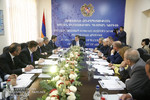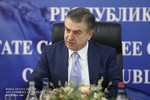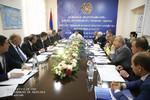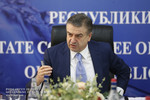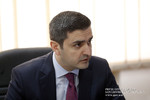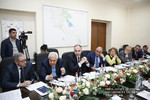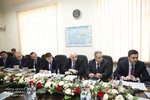Friday, 28 April 2017
Karen Karapetyan Familiarized with Institutional Reform in Water Management
Prime Minister Karen Karapetyan called at the State Water Management Committee (SWMC) by the Ministry of Energy Infrastructures and National Resources to discuss ongoing reforms with the committee’s top executives.
SWMC Arsen Haroutunyan reported that works are being carried out according to the government program. 37 water user associations have been consolidated and reorganized into 14 entities as part of the reform of irrigation system over the past six months. As a precondition, the WUAs shall be stationed in those communities facing irrigation problems in order to get a first-hand view of existing challenges during the irrigation season. The merger and consolidation of water user associations have optimized the staff by eliminating redundancies resulting in AMD 450-480 million annual savings. Two water-intake companies have also been merged; 35 million drams have been saved up. Arsen Haroutunyan said that one of the Committee’s 4 PIUs had been dissolved, with the three others reorganized into a single entity resulting in 134 million-dram savings.
Overall, the first stage of institutional reforms has led to AMD 620 million savings. In addition, the PIUs affiliated to the Committee held six competitions over the last six months, with contracts signed at a 25 percent lower coast than the estimated price resulting in half billion dram savings
The State Water Management Committee Chairman said that a financial recovery plan for system of water management has been developed, which will be submitted to the Government within 1-1.5 months. The paper will contain recommendations related to bad debts that have accumulated since 2002.
With reference to the ongoing registration process, he reported that water meter hubs have already been installed on irrigation systems and the water pipes off Lake Sevan, noting the need to set up 2100 more meters in order to achieve full nationwide coverage. The project cost is estimated at USD 2-3 million. Work is underway with donors to attract funding. According to the Committee Chairman, each month WUAs report back activities; their performance is estimated based on specific indicators. Mr Harutyunyan said that the reform may lead to the system’s handover to private management. Water meters were said due to be installed in all pumping stations in order to eliminate energy losses.
Stressing the need for continued implementation of reforms, Prime Minister Karapetyan stated in part, “You have chosen the right path with regard to the WUAs. You should be very tough as to the full implementation of the registration system. After you have completed the introduction of the metering system, you will understand the fixed costs and we will be able to talk about infrastructure improvement. Go ahead boldly. "
The Prime Minister instructed those responsible to help the Committee attracting financial resources for the program of registration process in the irrigation system. He referred to the irrigation tariff policy, the supply of drinking water and the quality of services. Concerning the signing of contracts between Veolia Water CJSC and customers, the Head of Government urged them to speed up the process and move forward with a clear timetable.
Arsen Haroutunyan next advised that the duration of water supply in Yerevan has reached an average of 23.65 hours per day. Asked about the number of customers left out of Veolia Water’s coverage, Mr Haroutunyan advised that there are currently 560 such communities throughout the country. The SWMC sees the solution in their division into clusters and the involvement of private operators.
Surprised at the presence of 560 unattended communities, Karen Karapetyan said, “It turns out that half the communities are outside the system. What is the problem? What is the rationale behind the shortfall? Why 40 percent of the population is out of service.” The Head of Government highlighted the need to involve private operators, noting that it is unacceptable that 40 percent of the population may live in quite a different environment.
Then details were provided of the pace of Vedi reservoir construction. It was reported that the 90 million euro-worth project was successfully launched on January 23 and is continued successfully. The project will take 48 months to complete. The reservoir has a total capacity of 29 million m³ on 3200 hectares of irrigated land.
They meeting also discussed the situation with the development wastewater treatment plants in major urban settlements and their streaming to Lake Sevan, the biological cleansing, the reconstruction of Arpa-Sevan tunnel, as well as issues related to the planned transfer of water into Lake Sevan.







